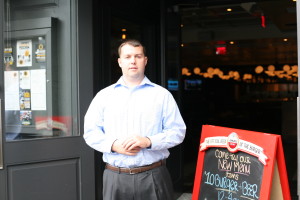Restaurant loans no longer on the menu
Rave reviews and a steady business income no longer guarantee a bank loan for restaurant owners. What lenders now want to see on the table are real property assets that can be used as collateral in case a restaurant tanks.
Before the recession, a restaurateur could apply for bank loans and pool financial resources from a few committed business partners. But those wishing to open small restaurants today have found it increasingly difficult to secure loans.
Gerry Houlihan, a restaurant broker at Houlihan & O”™Malley Real Estate Services and principal of Houlihan Business Brokers in Bronxville, said the U.S. Small Business Administration is no longer lending to restaurant owners who don”™t own the real estate where their businesses operate. It”™s keeping the market “extremely soft,” he said.

SBA loans had been one of the more common methods of financing a restaurant. But since the recession, eligibility rules for an SBA loan have become stricter and restaurant owners have fewer options for financing their businesses, Houlihan said.
“If you were going for an SBA loan, it was based on the income of the business that was being purchased, which required showing three to five years of tax returns, positive net income, and of course the furniture, fixtures and equipment had to be in good condition,” Houlihan said.
But now banks rarely give out loans to small restaurants because they usually lease space, said Leonard Carraturo, vice president relationship manager for business banking at Chase Manhattan Bank in White Plains.
Before the credit market collapse in 2008, Houlihan said about 60 to 70 percent of the more than 100 restaurant deals he closed involved buyers securing home equity loans, while 15 to 20 percent of the purchase deals were financed by SBA-backed loans. Today, he said none of his buyers are applying for bank loans through either process because banks are not willing to lend to restaurants without collateral.
An exception to this trend is Alvin & Friends, a New Rochelle restaurant serving Caribbean and southern-style food, which opened in 2010 in a 1,200-square-foot space with 50 seats at 49 Lawton St.
Alvin Clayton, a majority partner in Westchester Friends Management Group, said the partners had subleased their space from Villarina”™s Pasta & Fine Foods Co. to avoid being “under a gun” and “choked with a high mortgage.”
The arrangement greatly reduced the cost of rent for Clayton and his investors. When Villarina”™s moved out, Alvin & Friends investors pooled their resources to finance a larger space to accommodate their growing dining and private-party business.
This year, the six investors, including Clayton and his wife, Gwen, bought a 5,000-square-foot space at 14 Memorial Highway. With the purchase, the business qualified for an SBA loan.
“Because we”™ve been open for two years, and we had been doing well, we can show the bank that in this economy, we were operating on our own without getting loans,” Clayton said.
Clayton added that it made sense to buy the property instead of leasing because the mortgage payment was equivalent to the monthly rent at the restaurant”™s old location. Buying the property gives them more security and eliminates the risk of a landlord pulling the rug out from under them, he said.
For other restaurant owners, two or three years of running a business doesn”™t guarantee a bank loan.
John Gazzola, co-owner and partner in Butterfield 8, an American gastropub franchise, knows from experience that trying to get bank loans without real estate as collateral doesn”™t “amount to much.” His company, Public House Investments, has opened Butterfield 8 restaurants in midtown Manhattan, Stamford and downtown White Plains. The company has also opened Lola”™s Mexican Kitchen in White Plains and Stamford and Mulberry Street Italian Kitchen in White Plains.
Gazzola and his partners are financially sound with about 20 restaurants successfully operating in five states and the District of Columbia. When opening their Westchester eateries in 2012, they were able to finance their investment without seeking a bank lender.
“Over the years, we realized how difficult it is to get a loan,” Gazzola said. “We”™re pretty much self-funded. The time it takes for you to wait for bank approvals costs money. When you have to wait for a loan to come through, you”™re just sitting on your property paying additional rent and utility.”
Sometimes a restaurant owner can draw on an extended track record of success to obtain a bank loan.
Chris Vegara, executive chef and partner in Saint George, a French bistro opening this month in Hastings-on-Hudson, secured a loan with Chase Manhattan Bank using another property as collateral. Front-of-the-house team member Jason Steinberg said this will be Vegara”™s third restaurant, and he has built a relationship with Chase Manhattan through the years.
“Chris opened his first restaurant 10 years ago and we already knew a good person to be talking to about loans,” Steinberg said. “We didn”™t have to cold call.”
Even with a loan, most renovations to the former Buffet de la Gare space will be done with their own labor and paid for out of pocket.
“I”™ll be reupholstering the chairs,” Steinberg said. “I taught myself to do that. I”™ve painted the interior walls myself.”